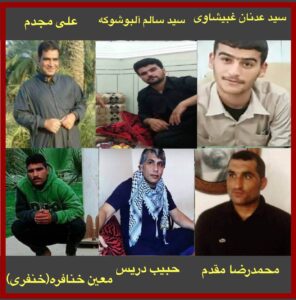Hassan Abayat, an Ahwazi Arab political prisoner, was executed at dawn today, Monday, 20 February, in the Iranian regime’s infamous Sepidar Prison in the regional capital, Ahwaz city.
Announcing the news, the Ahwaz Human Rights Organisation stated that 40-year-old Abayat was arrested in December 2011 by regime intelligence service personnel over accusations that he was in contact with Ahwazi dissident groups, along with several other Ahwazi citizens, identified as Khalid Abidawi, Eidan Beit Sayah, Jassim Saed, Reza Abidawi and Jalil Naami.
Prior to his arrest, Abayat worked in a kebab restaurant with his father and brother in Hamidieh city near the regional capital.
He was subsequently sentenced to death on charges of ‘waging war against God’, ‘corruption on earth’, and terrorism-related charges (Iran’s regime routinely classifies dissent as terrorism) by Judge Farhadovand at the first branch of the regime’s ‘Revolutionary Court’ in Ahwaz. The sole ‘evidence’ used to justify his conviction was ‘confessions’ reportedly extracted from him under torture; again, this is standard regime policy.
The five other men arrested along with Abayat were each sentenced to 20 years on charges of illegal assembly, of conspiring to act against the national security of the country through membership of exiled Ahwazi opposition groups, of producing online anti-regime ‘propaganda’ on social media, and of participating in demonstrations.
According to the ‘Atlas of Iran’s Prisons’, this political prisoner and the others convicted in this case were “subjected to physical torture” during the interrogation,
during which “the interrogators threatened them many times to force these people to admit to false accusations.” The interrogators also threatened the men that if they refused to admit to the false charges against them, the regime “would also arrest their families “. This is not an idle threat on the regime’s part, but standard policy towards anyone refusing to confess to false charges against them.
According to the details of the torture provided in the report, “[the interrogators] tied them to a special torture bed and tortured them with cables for several months. They were also tortured by use of electrical clips attached to the sensitive parts of their bodies, the effects of which can still be seen on some of their bodies years later.”
The report states that the torture inflicted on Hassan Abayat was so intense that “new skin was created in some parts of Hassan Abayat’s body due to the shocks inflicted by the cable.”
Six more Ahwazi prisoners were sentenced to death last week

Meanwhile, the fourth branch of the regime’s ‘Revolutionary Court’ in Ahwaz city issued six more death sentences against six other Ahwazi political prisoners last week, on Tuesday, 14 February. As is standard practice in the regime’s ‘justice’ system, the six prisoners, currently being held in the Sepidar and Sheyban prisons in the regional capital, were denied any legal representation to defend them, with the court’s ‘trial’ procedures, which are simply a legal formality to rubber-stamp the pre-decided verdict, being held in their absence while the men were imprisoned.
The six activists, who were sentenced to death on the usual charges of ‘threatening national security’ and having contacts with Ahwazi groups in exile, have been identified as follows:
1- Ali Mojadam, from Ahwaz city, is currently being held in Sheyban prison.
2- Moein Khanfari, from Ahwaz city, is currently being held in Sheyban prison.
3- Mohammadreza Moghadam, from Falahiyeh city, is currently being held in Sheyban prison.
4- Sayyed Salem Alboshukeh, from Falahiyeh city, is currently being held in Sepidar prison.
5- Seyed Adnan Ghobishawi (Mousavi), from Falahiyeh city, is currently being held in Sepidar prison.
6- Habib Darris, from Ahwaz city, is currently being held n Sheyban prison.
The Iranian Intelligence service arrested most of the six Ahwazi activists in February 2017 and the others in early 2018.
The Ahwazi activists were charged with the ‘offences’ of Moharebeh (Enmity to God), acting against national security, forming a group, communicating with the exiled dissident groups opposing the regime, and propagandising against the Islamic regime. After completing the interrogation process in the infamous investigation cells of the intelligence service in Abadan city, the prisoners were transferred to the 12th branch of the Revolutionary Prosecutor’s Office headed by the investigator Kambiz Hashemian, where they were formally charged, with their sentence being issued in branch 4 of Ahwaz Revolution Court.
During their detention, all of the prisoners were subjected to severe physical torture, and forced confessions were obtained from them through torture, beatings, and threats.
It should be noted that, along with the six people sentenced to death, six other Arab citizens, including two women, were simultaneously sentenced to long-term imprisonment, and other harsh sentences.
The six other Ahwazi prisoners sentenced to long-term imprisonment have been identified as follows:
1- Faris Amouri (Ramahi), 35 years in prison.
2-Jasem Alboghbish, 15 years in prison.
3- Qasim Moghadam, 5 years in prison.
4- Iskandar Moghadam, 5 years in prison.
5- Raad Maniat, 5 years in prison.
6-Tawfiq Maniat, 5 years in prison.
The persistent silence of the international community in the face of Iran’s crimes against the Ahwazi people in general and Ahwazi political prisoners, in particular, continues to embolden the Iranian regime and to reassure it that it can literally get away with murder, racist oppression and the numerous other human rights abuses it perpetrates against the indigenous Ahwazi people. Without real solidarity and real action to end these grotesque crimes, these sufferings, ethnic-based oppression and extrajudicial killings will continue.
